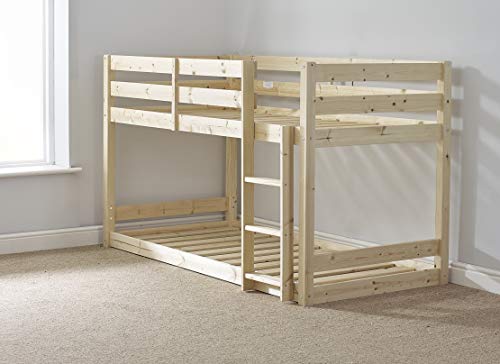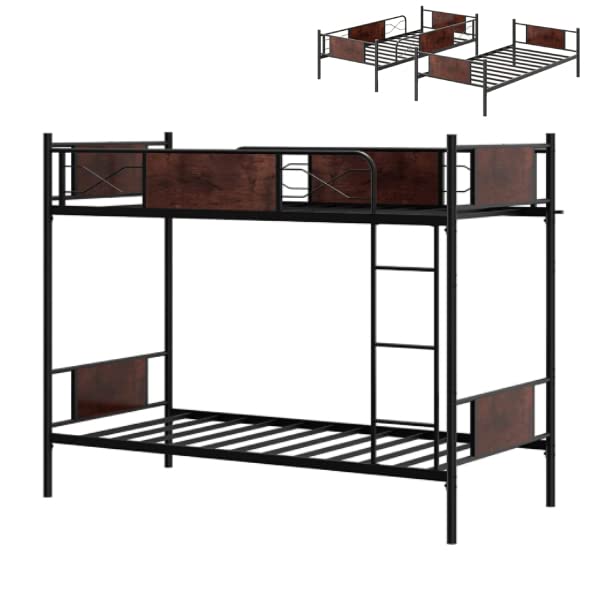10 Bunk Bed And Single Bed Tips All Experts Recommend
페이지 정보
작성자 Emerson Faith 작성일 24-11-06 08:03 조회 8 댓글 0본문
 Choosing Between a Bunk Bed and single bunk beds with stairs Bed
Choosing Between a Bunk Bed and single bunk beds with stairs BedIt's important to take into consideration the dimensions of the mattress when deciding between a bunk bed or single beds. Twin mattresses are perfect for children or adults who are sleeping on their own. They work best in rooms measuring 7 feet by 10 feet.
 A full-sized twin over a twin bed is ideal for families with children of different age groups. Another option that is very popular is the futon bunk beds that split into singles which includes a lower futon that can be converted into beds.
A full-sized twin over a twin bed is ideal for families with children of different age groups. Another option that is very popular is the futon bunk beds that split into singles which includes a lower futon that can be converted into beds.Space Saving
Bunk beds are an innovative solution for families seeking to maximize room space. This kind of furniture allows families to put two beds in the same room, without taking up the floor space which could be used for other furnishings such as desks and dressers.
Bunked beds are a popular option for kids' rooms due to the fact that they can help create more study and play areas, while also reducing space in smaller living spaces. They are, however, an excellent option for adults too and can provide a chic alternative to the traditional single bed frames. Savvy bunkbed owners can add accessories and decors to make their beds more personal and make their beds feel more cozy.
The obvious benefit of bunk bed is that it allows children to share the same room. This arrangement can reduce conflicts within the home by permitting children to share the same room. This arrangement can increase the amount and variety of storage space in a child's bedroom by eliminating the need for large furniture such as dressers.
There are many different types of bunk beds, however they all share the same designs to maximize space. Standard bunk beds feature two mattresses of the same size stacked on top of each other. A twin over full bunk bed is arranged in the same manner, but it has two full-size mattresses on the bottom, and a twin-sized mattress on the top. A futon bunk is a mix of a normal bunk and an American-style futon couch which converts to an ottoman. It is a great option for families seeking an old-fashioned, space-saving bunk.
The bunk beds with multiple levels may require more frequent repairs and maintenance. Additionally, bunk beds may not be as accessible for those with mobility issues or who are at risk of falling when as compared to single beds. When choosing the bedding for their facilities healthcare facilities must balance the initial cost with the long-term cost.
Single beds are more affordable to maintain than bunk bed single size beds, and their simple design makes them easier to clean and repair. They can also be moved to accommodate patient needs or accommodate changes to the layout of rooms. This flexibility is particularly useful for healthcare facilities that must accommodate a wide variety of demographics for patients.
Convenience
Bunk beds are a great solution for families with children who differ in age. Similar to a twin over full bunk configuration is ideal for siblings with different preferences for sleep. For example, younger kids may prefer to sleep close to their parents whereas older kids may prefer sleeping alone.
Bunk beds can also save money because they reduce the amount of mattresses that need to be purchased. Some bunk beds also have a built-in system of storage, which eliminates the need for separate dressers. This helps to minimize the amount of clutter in the rooms of patients and make the most space.
Bunk beds can also help improve the bed capacity of an institution. They are perfect for crowded rooms like youth psychiatric and rehabilitation centers in which patients share rooms. They can also be stacked to accommodate large numbers of residents in long-term care facilities.
While bunk beds can provide a variety of advantages, they can be more challenging to maintain and clean than single bunk bed frame beds. The added stress on frames and joints could cause wear and tear, which requires more frequent maintenance and inspections. The design of the bunk bed can cause problems for those with mobility issues or health issues. Climbing up and down can be dangerous, especially for seniors.
Single beds On the other hand, can be rearranged to suit different room layouts and provide patients with a personal environment. Journal of Environmental Psychology states that this flexibility can increase the satisfaction of patients by 25 percent.
When selecting the best type of bed for your facility, think about the demographics of your patients as well as your space and maintenance requirements. Bunk beds can be an ideal option for facilities looking to save space or require less set-up time. Single beds are a good choice for rooms that have high turnover or a limited budget.
If you are considering a bunk bed, be certain to select a model that has an easy-to-clean mattress. The most suitable mattresses for bunk beds are innerspring, latex memory foam, or hybrid. However, some people prefer futon. When buying a bunk bed, make sure to whether the mattress is slatted or upholstered. A bunk bed with slats is a base of slats, or slat rolls, which are screwed or hammered to support the mattress.
Safety
When constructing an health facility, bed safety is a major aspect to consider. Bunk beds are able to provide a secure environment for patients, by efficiently using space while minimizing risk. They can also reduce the risk of injury due to their a lower center-of-gravity, which is good for the physically impaired and elderly.
The key to bunk bed safety is proper assembly and regular maintenance. Examine for loose or unstable parts and strengthen any weak spots to avoid structural failure. Adhere to manufacturer-recommended weight limits, as excess loading can compromise stability. To avoid falling or entrapment, make sure that ladders are securely attached to the frame.
Children are allowed to sleep on the top bunk only after demonstrating their ability to safely climb up and down. They should be capable of taking care of their personal hygiene without supervision or assistance such as using the bathroom and dressing themselves. In addition, bunk beds must be positioned far enough away from windows to minimize the chance of injuries resulting from windows.
Bunk beds have a disadvantage in that they are not great at separating noise and motion, which can be annoying to sleepers with light sleep. People who sleep in the lower bunks may feel their counterparts shifting and turning in their beds or hear them coming up and down at night.
Single beds, however, provide more sound and better motion isolation. Moreover, they offer the versatility to accommodate a wide variety of patient demographics and room dimensions.
The budget and the specific requirements of a facility will determine which type of bed to choose. A bunk bed is an affordable alternative for hospitals with limited space and a high patient turnover, whereas single bunk bed metal beds are suitable for long-term care units and rehabilitation centers with consistent populations. Ultimately, it is important to balance the initial cost with long-term value, emphasizing patient comfort and safety. Regular inspections and timely maintenance are essential for all beds, regardless of their kind. According to the Facilities Management Journal, a proactive approach to maintenance can cut down on repair costs by up to 15%.
Functionality
Bunk beds are not only an efficient way to save space but they also create a sense of community among friends or siblings who share rooms. They are ideal for families with children of various age, or even multiple children sharing a room. They can also be used in youth psychiatric or rehabilitation facilities where patients have to be able to sleep together in the same room in a group.
Bunk beds are available in various configurations and some even include storage space. Twin over full bunks are popular and usually have one twin mattress on the bottom with the top of the mattress doubled that is perfect for families with children of different ages or for adults who prefer sharing a larger bed with their spouse or a companion. L-shaped bunks are also a more elegant alternative to the traditional bunk layout, with the lower portion of the unit containing the futon, which can be used as a couch or adjusted to create the double bed.
Bunk beds are more efficient in space however they require more maintenance due to the multi-tiered design. The Facilities Management Journal highlights that this could include frequent inspections and repairs to ensure safety. white single bunk beds beds are, on the other hand are more manageable and require less routine attention, which makes them a more cost-effective option for long-term use.
When selecting bunk beds, you must be aware that they provide less privacy because guests are sharing the same space. This can be difficult for some, particularly in shared housing settings such as rehabilitation centers or transitional housing.
The bunk beds as well as single beds can be customized with additional features such as desks and storage solutions to create a more practical sleeping space. This is especially beneficial in smaller spaces that require to make the most of their space. They can help to eliminate clutter and free up space on the floor for other furniture or activities. Some bunk beds are even separated into two separate beds. This allows them to develop with the child and continue to provide comfort as they reach adulthood.
- 이전글 «Холостяк (Украина) 13 сезон 7 выпуск 13.12.2024» шоу 2024 смотреть онлайн все серии подряд.
- 다음글 Холостяк (Украина) 13 сезон 2 выпуск 08.11.2024 смотреть онлайн в хорошем качестве все серии.
댓글목록 0
등록된 댓글이 없습니다.
